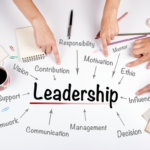Emerging Leaders Program Are Key Skills for the New Era
Emerging leaders program is facing unprecedented challenges and opportunities as the leadership landscape continues to evolve. With technological disruptions, shifting societal expectations, and the increasing importance of emotional intelligence, today’s leaders must be more adaptable and self-aware. This article explores the essential skills for emerging leaders program for a new era, emphasizing the importance of coaching, self-awareness, and emotional intelligence.
Importance of Navigating Technological Disruptions for Emerging Leaders Program
Preparing for Technological Shifts
Technology is reshaping the business world at a rapid pace. Emerging leaders must keep up with these changes and leverage them to drive innovation and efficiency within their organizations. Here are key strategies for preparing when technology disrupts the status quo:
- Continuous Learning: Staying updated with the latest technological trends and tools is crucial. Leaders should invest time in learning about artificial intelligence, machine learning, and other emerging technologies that can impact their industry.
- Fostering Innovation: Encouraging a culture of innovation within the team can help in adapting to technological changes. Leaders should promote creative thinking and provide resources for experimentation.
- Adapting Business Models: As technology evolves, traditional business models may become obsolete. Leaders need to be agile in adapting their strategies to stay competitive in a tech-driven marketplace.
The Crucial Role of Coaching
Why Coaching is Necessary
Coaching is an indispensable tool for leadership development. It provides leaders with the guidance and feedback needed to navigate complex challenges and enhance their skills. Here’s why coaching is essential for all leaders:
- Personalized Feedback: Coaching offers tailored advice and feedback, helping leaders identify their strengths and areas for improvement.
- Accountability: A coach can hold leaders accountable for their goals, ensuring they stay on track and achieve their objectives.
- Skill Development: Through coaching, leaders can develop crucial skills such as communication, decision-making, and conflict resolution.
Emerging Skills for Leaders
In the context of rapid change and increasing complexity, certain skills are becoming more critical for leaders. These include:
- Digital Literacy: Understanding and effectively using digital tools is fundamental in the modern workplace.
- Cultural Competence: As workplaces become more diverse, leaders must be adept at managing and leveraging this diversity.
- Change Management: The ability to lead through change and uncertainty is a valuable skill for emerging leaders.
Importance of Developing Self-Awareness For Emerging Leader Program
The Foundation of Effective Leadership
Self-awareness is the cornerstone of effective leadership. It involves understanding one’s strengths, weaknesses, and emotional triggers. Developing self-awareness can lead to better decision-making, improved relationships, and increased resilience.
Strategies for Enhancing Self-Awareness
- Reflection: Regularly reflecting on one’s actions and decisions can provide insights into personal behavior patterns.
- Feedback: Seeking feedback from peers, mentors, and team members can help leaders gain an external perspective on their performance.
- Mindfulness Practices: Engaging in mindfulness activities, such as meditation or journaling, can enhance self-awareness by promoting a deeper understanding of one’s thoughts and emotions.
Increasing Emotional Intelligence
The Importance of Emotional Intelligence
Emotional intelligence (EI) is the ability to recognize, understand, and manage one’s own emotions and the emotions of others. High EI is associated with better communication, stronger relationships, and effective conflict resolution.
Components of Emotional Intelligence
- Self-Awareness: Recognizing and understanding one’s own emotions.
- Self-Regulation: Managing and controlling one’s emotional responses.
- Motivation: Being driven to achieve personal and professional goals.
- Empathy: Understanding and sharing the feelings of others.
- Social Skills: Building and maintaining healthy relationships.
Developing Emotional Intelligence
- Active Listening: Practicing active listening can enhance empathy and understanding in interactions.
- Emotional Regulation Techniques: Techniques such as deep breathing, cognitive restructuring, and positive self-talk can help in managing emotions.
- Empathy Training: Engaging in activities that promote empathy, such as volunteering or team-building exercises, can improve EI.
Heart Intelligence: Improving Communication and Decision-Making
What is Heart Intelligence?
Heart intelligence refers to human intelligence’s intuitive, emotional, and heart-centered aspects. It involves accessing deeper levels of perception and wisdom, often associated with feelings of compassion, courage, and love.
Benefits of Heart Intelligence
- Enhanced Communication: Leaders who utilize heart intelligence can communicate more authentically and effectively.
- Better Decision-Making: Intuitive insights can complement rational analysis, leading to more holistic decision-making.
- Stronger Relationships: Heart-centered leadership fosters trust and connection with team members.
Cultivating Heart Intelligence
- Heart-Focused Breathing: A technique where individuals focus on their heart area while breathing slowly and deeply to calm the mind and access intuitive insights.
- Appreciation Practices: Regularly practicing gratitude and appreciation can enhance heart intelligence by fostering positive emotions.
- Compassion Exercises: Engaging in practices that promote compassion, such as loving-kindness meditation, can strengthen heart intelligence.
Instinct and Decision-Making
The Role of Instinct in Leadership
Instincts play a crucial role in leadership by guiding decisions in uncertain or rapidly changing situations. Trusting one’s instincts can lead to quick, effective decision-making when time is of the essence.
Balancing Instinct with Analysis
While instincts are valuable, they should be balanced with rational analysis. Leaders can improve their decision-making by:
- Combining Data with Intuition: Using data and analytics to inform decisions while considering intuitive insights.
- Reflecting on Past Experiences: Learning from past successes and failures to refine instinctual decision-making.
- Seeking Diverse Perspectives: Consulting with team members and experts to gain different viewpoints and reduce bias.
Fostering Creativity and Resilience
The Importance of Creativity
Creativity is essential for problem-solving and innovation. Leaders who encourage creativity can drive their organizations forward by developing unique solutions and new ideas.
Cultivating a Creative Environment
- Encouraging Experimentation: Allowing team members to experiment and take risks can foster a culture of creativity.
- Providing Resources: Ensuring that the team has access to the tools and resources needed for creative work.
- Recognizing and Rewarding Creativity: Celebrating creative achievements can motivate others to think outside the box.
Building Resilience
Resilience is the ability to bounce back from setbacks and maintain focus during challenges. It is a critical skill for leaders facing the volatility and uncertainty of the modern business environment.
Strategies for Developing Resilience
- Building a Support Network: A strong support system can provide emotional and practical support during difficult times.
- Maintaining a Positive Outlook: Focusing on positive aspects and learning from failures can enhance resilience.
- Practicing Self-Care: Engaging in activities that promote physical and mental well-being can help leaders stay resilient.
Research about emerging Leadership Strategies:
According to CCL’s recent report, there are 3 strategies gleaned from their research to help you attract, retain, and engage your emerging leaders
Heart Acuity Coaching Services
At Heart Acuity, we specialize in leadership coaching that integrates heart intelligence and spiritual intelligence to develop well-rounded, resilient leaders. Our tailored coaching programs are designed to enhance self-awareness, foster emotional intelligence, and improve decision-making skills.
Why Choose Heart Acuity For The Developing Emerging Leaders Program?
- Personalized Coaching: Our programs are customized to meet the unique needs of each leader, ensuring they receive the most relevant and effective guidance.
- Experienced Coaches: Our coaches bring a wealth of knowledge and expertise to support your leadership journey.
- Holistic Approach: We focus on developing both the mind and the heart, ensuring leaders are equipped to handle the complexities of modern leadership.
To learn more about our leadership coaching services and how we can help you become a more effective, heart-centered leader, visit Heart Acuity.
Conclusion
Emerging leaders programs must navigate a complex and rapidly changing landscape. By developing key skills such as self-awareness, emotional intelligence, and heart intelligence, and leveraging resources like those from Heart Acuity, they can effectively lead their organizations into the future. Embracing technological advancements, fostering creativity, and building resilience are essential strategies for thriving in this new era of leadership.


